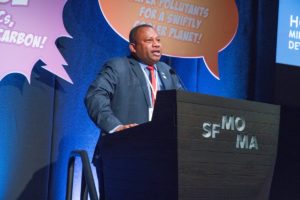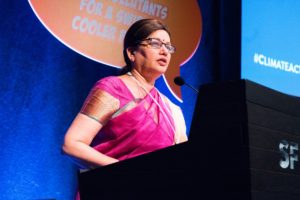Nine individuals, organizations and collaborations were celebrated at this year’s Global Climate Action Summit in San Francisco for action they have taken to reduce short-lived climate pollutants (also known as super pollutants) and protect the climate.
They received their awards at a gala ceremony last week at the San Francisco Museum of Modern Art.
Opening the awards ceremony Inia Seruiratu, COP 23 Climate Champion and Fiji’s Minister for Agriculture, Rural & Maritime Development, and National Disaster Management, said reducing short-lived climate pollutants like black carbon, methane, and hydrofluorocarbons can prevent up to half a degree Celsius of predicted warming, prevent 2.4 million premature deaths and save more than 50 million tonnes of crops each year.
“This is an opportunity we can’t miss,” Minister Seruiratu said. “We need to achieve the highest level of ambition to keep temperature increase to 1.5 degrees Celsius, this is vital for small island communities and other vulnerable regions around the world. The recipients of these awards exemplify what action looks like, they are fast action heroes, they are putting solutions in place through individual efforts, policy and innovation, and these are clear examples of what is needed in the climate action arena.”
Erik Solheim, Executive Director of the United Nations Environment Programme, said: “We have an optimistic message to share here. These awardees from every corner of the world are examples of what can be done to change the world. Citizens and political leadership and business working together is the way we can change the world.”
The Awards Ceremony closed out Super Pollutant Day, a day of knowledge sharing, calls to action and commitments to reduce these pollutants from national, state, and local governments, business, and non-profit organisations. World leading scientists like Veerabhadran Ramanathan and Nobel Laureate, Mario Molina, noted that short-lived climate pollutants are the low hanging fruit when it comes to warming. Solutions exist now, they’re technically feasible, and in many cases can be achieved at no-net cost.
Dr. Molina said: “When it comes to climate change you can either be pessimistic or optimistic. I choose to be optimistic. There’s a lot we can do to rapidly reduce warming.”
The 2018 Climate and Clean Air Awardees are a snapshot of efforts from every corner of the globe, from every level of society, and across numerous sectors taking place right now to reduce near- and-long term warming. The awardees come from diverse backgrounds including local and national government, academia, the private sector and NGOs.
This year’s award winners (by category) are:
Individual Category
Dr Veerabhadran Ramanathan, Distinguished Professor of Climate and Atmospheric Sciences, Scripps Institution of Oceanography, University of California at San Diego, for his contributions to science and our understanding of super pollutants. His work has been, and continues to be, fundamental to the way we understand and address climate change.
Professor Ramanathan said: “The new science of weather extremes and its documented public health impacts, has significantly elevated the importance of using super pollutants mitigation to bend the warming curve by about 0.60C within 25 years. It is a race against time; but we can win this race since scalable solutions are available with numerous living laboratories where they are being implemented.”
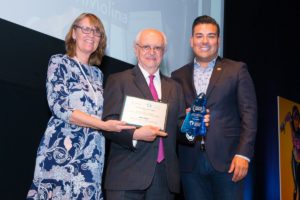
Dr Mario Molina (centre) receiving his award from Helena Molin Valdes (left) and California Senator Ricardo Lara (right).
Dr Mario Molina, Nobel Laureate: 1995 Nobel Prize in Chemistry, for his contributions to science and our understanding of short-lived cliamte pollutants, in particular the impacts of chlorofluorocarbons (CFCs) and hydrofluorocarbons (HFCs) at heating the atmosphere. Dr. Molina’s scientific discoveries, and the national and environmental policies it has helped shape, has contributed to the wellbeing of all humanity.
Leonardo DiCaprio for his advocacy work and awareness raising on the issue of climate change and for his philanthropy and environmental efforts through the Leonardo DiCaprio Foundation. The Leonardo DiCaprio Foundation (LDF) has awarded over USD $80 million in grants, funding 200+ high-impact projects in 50 countries.
Catherine McKenna, Minister for Environment and Climate Change, Canada. Under Minister McKenna’s, leadership, Canada has become a global leader in reducing short-lived climate pollutant (SLCPs) emissions both domestically and through international efforts. Since Minister McKenna’s election in 2015, Canada has decreased its black carbon emissions by 18% from 2013 levels, and is projected to reduce them by 30% by 2030. Methane emissions are also projected to decrease by 16% from 2012 by 2025.
Hal Harvey, CEO Energy Innovation, for transforming philanthropic investment in climate action and promoting practical, results-driven solutions. Mr Harvey has proven that the climate problem is solvable, and that the move to zero-carbon energy technologies can be accomplished.
Accepting his award Hal Harvey said: “With intense focus we can make a difference. It is crucial to understand which policy will drive change. Do the math, and see where you can focus and drive change. Once you identify the decision makers that can make a difference hit them with everything you’ve got and don’t let go until they act.”
Innovation
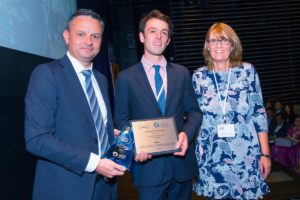
(Left to right) James Shaw, Minister of Climate Change, New Zealand; Oliver Kynaston, SimGas; Helena Molin Valdes, CCAC
SimGas has developed and distributed highly innovative and affordable small-scale biogas systems that are easily installed and maintained. These systems make use of livestock manure that would otherwise be discarded resulting in methane emissions. The biogas systems use this waste to generate gas for cooking that results in reductions in black carbon and CO2 emissions within homes, replacing traditional household energy sources such as wood and charcoal.
RDRS Bangladesh for working to introduce climate friendly rice cultivation practices that also saves water and decreases poverty for farmers in in North Western Bangladesh. RDRS Bangladesh oversees a multi-sector network of hundreds of farmers, well owners, researchers and trainers in 8 districts and 17 locations to test and adopt alternate wetting and drying, a planting method that can decrease methane emissions from rice paddies by half (50%) and save water and money for farmers. The Bangladesh government plans to scale up AWD rice production to 20% of total rice cultivation by 2030 as part of its Nationally Determined Contributions (NDCs).Presenting to these two awardees, James Shaw, New Zealand’s Minister for Climate Change, said more needs to be done to reduce emissions from agriculture.
“The global population will grow by another 2.3 billion people by 2050. We’ll have to produce more food in the next 50 years than we have in the last 500 yes in total. If food loss and waste was a country it would be the third largest emitter of greenhouse gases,” Minister Shaw said. “We need to dramatically reduce that and we need more global research to do that. New Zealand is working with countries and research and reduce greenhouse gases without compromising food production.”
Policy
The Award for Innovative Policy went to Pune Municipal Authority for its work to reduce emissions from waste.The environmental impacts are significant. The city estimates that it avoids the release of over 130,000 metric tonnes of carbon dioxide equivalent into the atmosphere each year. 29,000 tons of CO2 equivalent are also avoided through anaerobic digestion.
The award was received by Mayor of Pune, Mrs. Mukta Tilak, Mr. Shrinath Bhimale, Hon. Leader of House, Pune Municipal Corporation, ,Mr. Yogesh Mulik, Hon. Chairman Standing Committee and Mr. Suresh Jagtap, Joint Municipal Commissioner. Mayor Tilak said that Pune has banned all open dumping of solid waste and put in place innovative steps to reduce black carbon and help improve air quality.
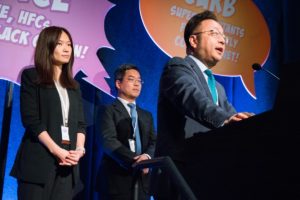
Professor He Kebin (right) accepts the award for Transformative Policy. He is joined by Gong Huiming (centre) and He Hui (left).
The Award for Transformative Policy went to a group of people from government, academia and non-profit organizations responsible for improving China’s Vehicle Emissions standards, including: The Ministry of Ecology and Environment, China; The Vehicle Emission Control Center of the Ministry of Ecology and Environment, China; Energy Foundation China; The International Council for Clean Transportation; and Tsinghua University. The standard will reduce air pollutants by up to 70% compared to current levels. The standard will also help reduce fine particulate and black carbon emissions by 99%.
The award was accepted by Professor He Kebin of Tsinghua University, Ms. He Hui of the International Council for Clean Transportation, and Mr. Gong Huiming from the Energy Foundation China. They also accepted on behalf of Mr. Wei Honglian, Director of Automotive Division of MEE and Mr. Ding Yan, Director of the Vehicle Emission Control Center of the Ministry of Ecology and Environment.
Professor He Kebin said: “By working together in this team we were able to get a special combination of political will, and scientific and technical solutions, which is essential to remove all of the barriers for improved vehicle emissions standards.”
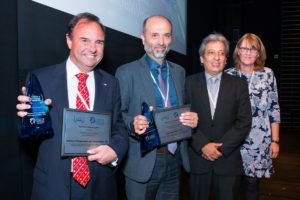
The award for Enabling Policy (left to right): Jose Luis Dominguez, Sub secretario de Transporte, Ministry of Transportation and Communications, Chile; – Gianni López Ramírez, Director Centro Mario Molina Chile; Manuel Pulgar Vidal Head of Climate and Energy Practice, WWF International, Helena Molin Valdes.
The 2018 Climate and Clean Air Award for Enabling Policy went to Centro Mario Molina Chile, and the Ministry of Transport and Communications, Chile, for their joint efforts to implement policy to reduce diesel air pollution.
Santiago is the first city to commit to soot-free technology for emission reductions. Centro Mario Molina Chile is helping implement the new standard. Chile’s Ministry of Environment estimates that the new standard will reduce nitrogen oxide (NOx) and PM2.5 emissions by almost 70%, by 2025. Santiago’s commitment is a strong signal to bus manufacturers both regionally and internationally that there is growing demand for cleaner bus technology in cities for better air quality and the climate.
Gianni López Ramírez, Director Centro Mario Molina Chile said: “Today we have one billion cars in the world. By 2050 it will be 3 billion. We need to give people the best public transit to keep people on buses. Santiago is taking the next step to electrification for the public transport system. By 2019 we will add 500 electric buses making Santiago a city with one of the highest numbers of electric buses in the world.”
About the Award
The Climate and Clean Air Awards recognise exceptional contributions and actions to implement projects, programmes, policies and practices that reduce short-lived climate pollutants (also known as super pollutants) – black carbon, methane, hydrofluorocarbons and tropospheric ozone. These pollutants contribute about 40% of the manmade heat energy being added to the planet every year.
Climate and Clean Air Award winners are involved in a wide range of activities and actions that include everything from individual efforts to state and national policies. Their work helps transform attitudes, spark innovation, provide business opportunities, and improve lives and livelihoods. Award winners exemplify what climate action looks like, they are fast-action heroes.
The independent jury for the 2018 award include:
• Bahijjahtu Abubakar, Head of Climate Mitigation (Clean Energy), Nigeria Ministry of Environment
• Rita Cerutti, Director General of Policy and Planning, Canadian Northern Economic Development Agency
• Emmanuel de Guzman, Secretary and Vice Chairperson, Philippine Climate Change Commission
• Manuel Pulgar Vidal, Head of Climate and Energy Practice, WWF International
• Youba Sokona, Vice-Chair of the Intergovernmental Panel on Climate Change (IPCC)
This year’s awards were supported by the Pisces Foundation, the ClimateWorks Foundation, and the Institute for Governance and Sustainable Development.
This article was originally published here, on the Climate and Clean Air Coalition’s website.
